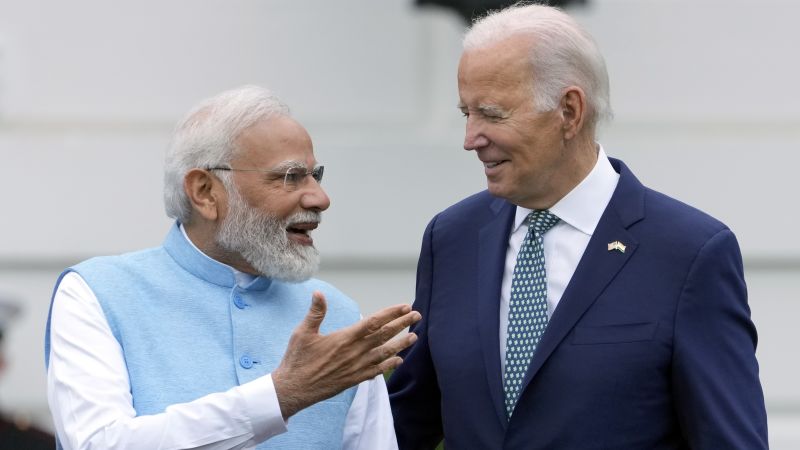CNN
—
Welcoming Indian Prime Minister Narendra Modi to the White House this week for a state visit – the most elevated form of American diplomacy – required President Joe Biden to make certain trade-offs and Modi to step out of his comfort zone, for at least a few minutes.
Modi, massively popular in India, has demonstrated a drift toward authoritarianism that has worried the West. He’s cracked down on dissent, targeted journalists and introduced policies that human rights groups say discriminate against Muslims.
Yet Modi and India, the world’s largest democracy, also represent a lynchpin in Biden’s strategy in Asia. The country recently surpassed China to become the most populous country on Earth. No major global challenge, from climate change to advances in technology, can be addressed without India’s buy-in, in Biden’s view. And in an era of growing tensions between the US and China, there are few partners that Biden is more eager to cultivate.
That, according to officials, was the rationale behind inviting Modi for a state visit, only the third of Biden’s presidency so far.
And so on Thursday the prime minister was welcomed to the White House with the highest trappings of American friendship: Marching troops on the South Lawn, extensive Oval Office talks and a state dinner in the evening, complete with a chef who specializes in plant-based cuisine to accommodate Modi’s vegetarian diet.
“I’ve long believed the relationship between the United States and India … will be one of the defining relationships of the 21st century,” Biden said during an elaborate welcome ceremony during which he hailed the friendship between the US and India.
Later, when the two leaders held a joint news conference that had been subject of intense negotiations between American and Indian officials, it was only Biden who called on reporters.
But Modi, for one of the only times since he assumed power, also responded to a question about his crackdowns on dissent and treatment of religious minorities.
“There’s absolutely no space for discrimination,” Modi said through a translator. ‘When you talk of democracy, if there are no human values and there is no humanity, there are no human rights, then it’s not a democracy.”
It was a remarkable moment for a leader who rarely holds news conferences, takes questions from the press or sits for international interviews. Press freedom groups say he’s overseen a crackdown on reporting.
The format of the news conference was only agreed upon after lengthy, delicate negotiations between the two sides. Indian officials initially balked at the White House’s insistence at holding one, two US officials familiar with the matter said.
Biden, in his own answer on Modi’s human rights record, underscored the shared values between the US and India.
“The prime minister and I had a good discussion about democratic values,” he said. “That’s the nature of our relationship, we’re straightforward with each other and we respect each other.”
“I believe that we believe in the dignity of every citizen, and it is in American’s DNA, and I believe in India’s DNA,” the president told reporters Thursday, adding that the two countries’ commitment to democracy “makes us appealing partners and enables us to expand democratic institutions across around the world.”
As he welcomed Modi to the White House earlier in the day, Biden sought to underscore the importance of shared values in the relationship moving forward.
“As democracies, we can better tap into the full talent of all of our people, and attract investments as true and trusted partners as leading nations, with our greatest export being the power of our example,” Biden said from a podium on the South Lawn. “Equity under the law, freedom of expression, religious pluralism and the diversity of our people. These core principles have endured and evolved even as they have faced challenges throughout each of our nation’s histories and fuel our strength, depth and future.”
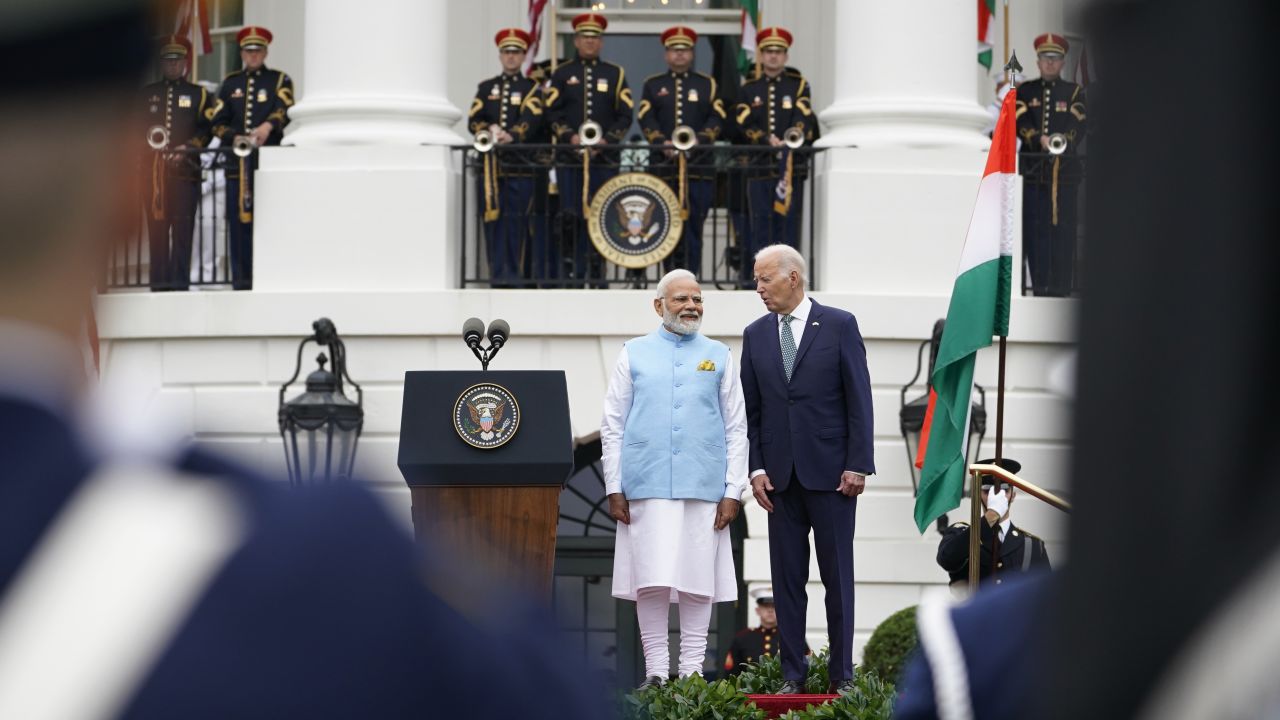
The meetings Thursday produced agreements on technology and defense cooperation and highlighted Biden’s efforts to shore up relationships in a region grappling with an increasingly aggressive Beijing.
Also up for discussion was Russia’s continuing war in Ukraine, a conflict on which India has not taken a definitive side. New Delhi’s continued purchase of Russian oil has helped prop up Moscow amid withering global sanctions.
“Fundamentally, we believe that the long-term trajectory of the US-India relationship is built on the notion that two democracies with shared value systems ought to be able to work together,” US National Security Adviser Jake Sullivan told a group of reporters ahead of the visit.
“That’s a long view. That’s a view rooted in our bet on the relationship between the people of the United States of America and the people of India,” Sullivan continued. “Part of what will be lifted up and celebrated in this visit will be those deep people and people ties.”
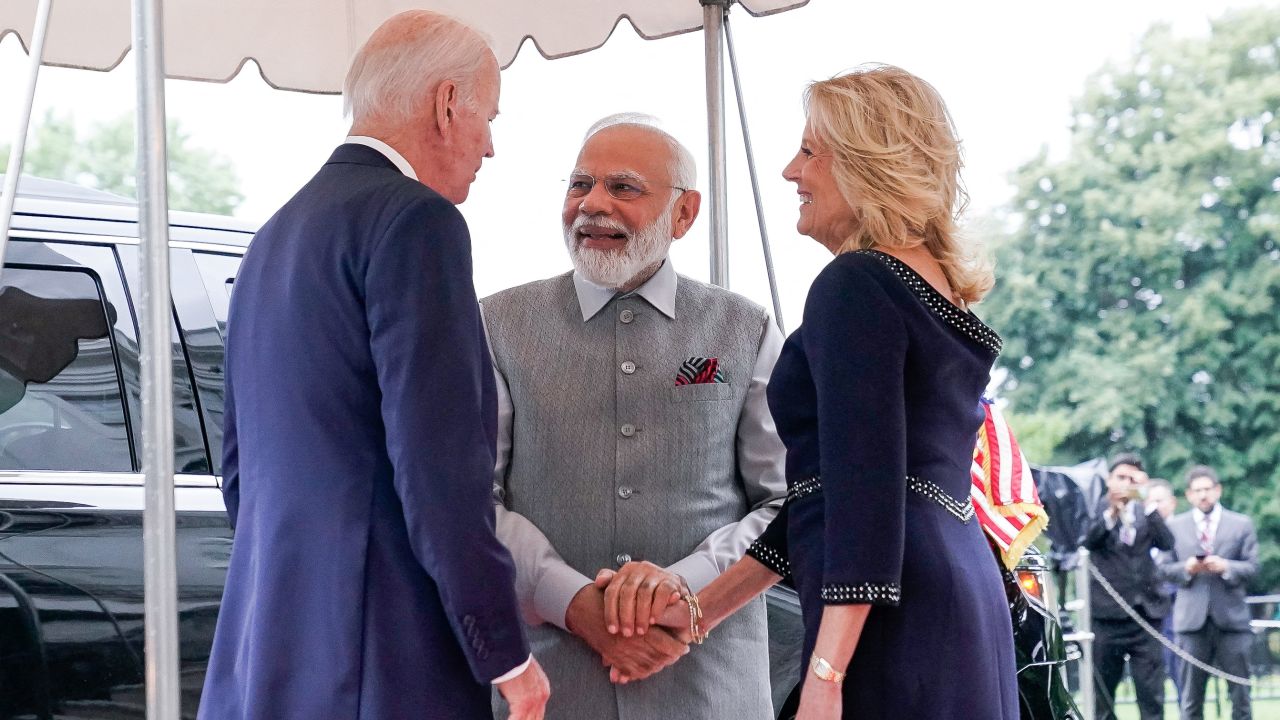
Modi is hardly the first leader with authoritarian tendencies to be invited for a state visit at the White House. President Barack Obama hosted Chinese President Xi Jinping in 2015, shortly after he assumed power in Beijing.
And Biden is not the first president to embrace Modi. Alongside President Donald Trump, the Indian prime minister attended a massive “Howdy Modi” rally in Houston for members of the Indian diaspora. Modi returned the favor in Ahmedabad with a “Namaste Trump” event held in the world’s largest cricket stadium.
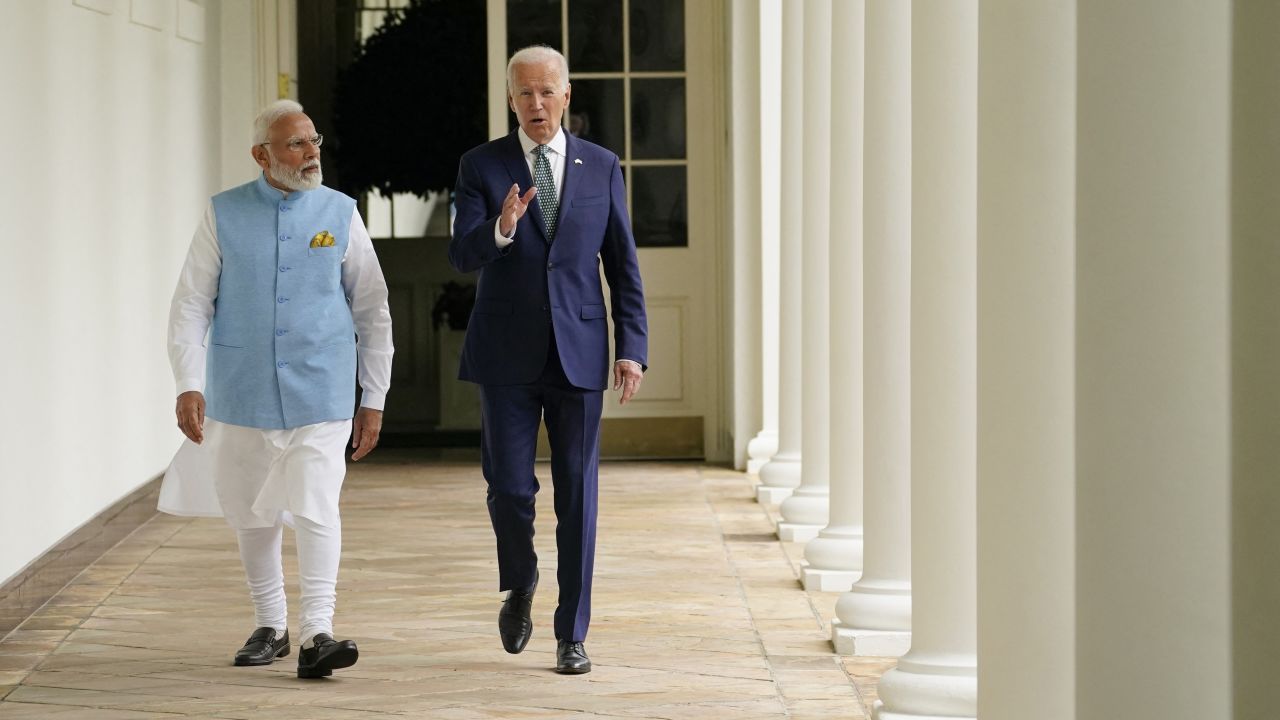
Other world leaders have offered a similar welcome. French President Emmanuel Macron will host Modi as the guest of honor at this year’s Bastille Day parade.
But Biden has made as a centerpiece of his foreign policy the battle between “democracy and autocracy,” a thematic backdrop perhaps nowhere more relevant than in India.
In March, the former leader of India’s main opposition political party, Rahul Gandhi, was disqualified as a lawmaker a day after he was handed a two-year jail sentence for defamation in a ruling his supporters called politically motivated.
Modi’s ruling Bharatiya Janata Party (BJP) has come under scrutiny from rights groups and opposition lawmakers for its increasingly strident brand of Hindu nationalist politics and an ongoing crackdown on dissent.
Modi himself was denied a visa to the United States in 2005 because of his alleged role in anti-Muslim violence three years earlier in Gujarat state, where he was chief minister. More than 1,000 people were killed, mostly Muslims. A Supreme Court-ordered investigation in India absolved him of blame.
A wide array of human rights groups, lawmakers and dissidents have made clear they want Biden to raise his concerns on Modi’s record when he’s at the White House. A group of more than 70 congressional Democrats wrote a letter to Biden this week urging him to bring up human rights concerns when he meets with Modi.
“You have once again made respect for human rights, press freedom, religious freedom, and pluralism core tenets of American foreign policy. Moreover, these tenets are necessary to the functioning of true democracy. In order to advance these values with credibility on the world stage, we must apply them equally to friend and foe alike, just as we work to apply these same principles here in the United States,” the lawmakers wrote.
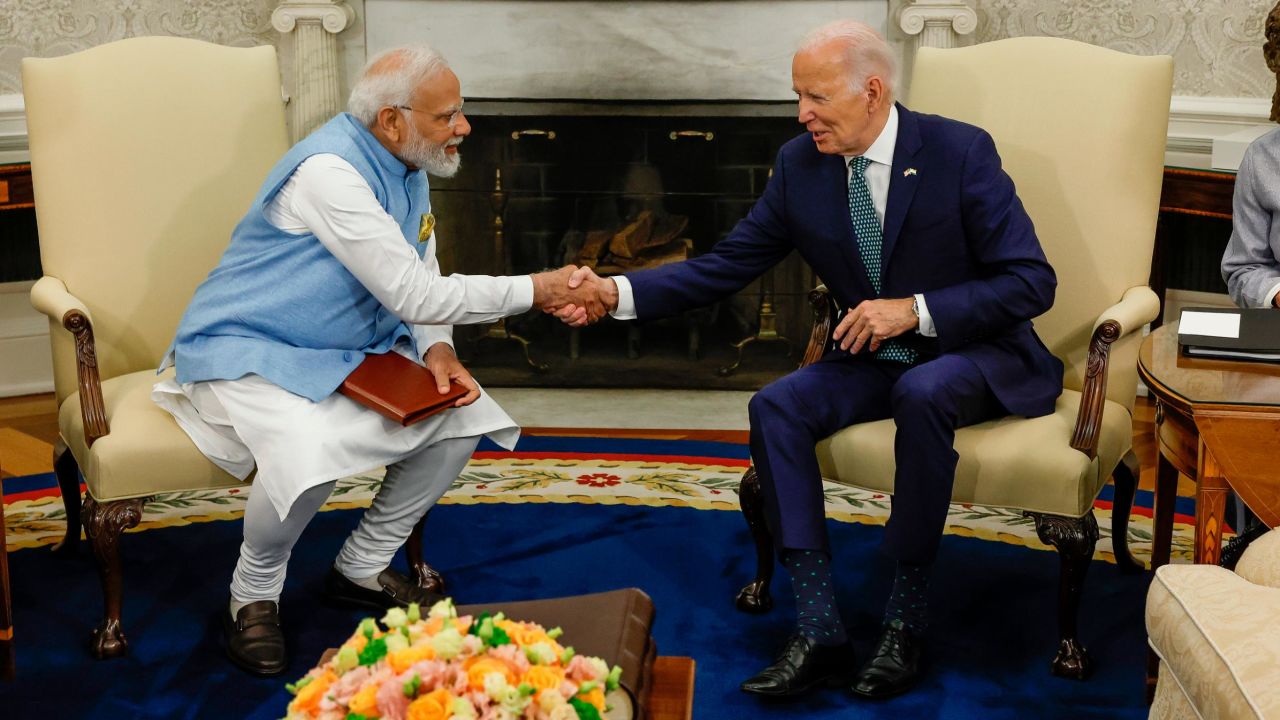
The letter was spearheaded by Rep. Pramila Jayapal, a Washington state Democrat, and Sen. Chris Van Hollen, a Maryland Democrat. Jayapal said in a tweet about the letter, “We must ensure freedom of the press, religious tolerance, internet access, & the diversity of political thought.”
Six Democratic lawmakers boycotted Modi’s address to Congress Thursday. Reps. Rashida Tlaib, Ilhan Omar and Alexandria Ocasio-Cortez pointed before the address to Modi’s treatment of Muslims.
Thursday’s state visit included announcements in the technology space as well as defense cooperation, including on defense sales, production and technology collaboration, an administration official said.
American defense trade with India had boomed in the past 15 years, and US officials have noted India is diversifying away from relying on any one nation, like Russia, for arms.
“You’ll see major cancellations of defense system purchases from Russia, in part because we know Russia can’t actually provide it, that Russia is consuming its own defense production very quickly in this terrible war in Ukraine,” a senior administration official said. “And everyone around the world who buys Russian equipment is worried about whether they can get spare parts and then new systems, given the supply chain problems that Russia is experiencing.”
Among the announcements Thursday was that India has committed to the purchase of MQ-9B SeaGuardian drones, deepening the two nations’ military ties amidst the backdrop of an increasingly bellicose China.
Biden and Modi planned an agreement between US manufacturer GE and the state-owned Hindustan Aeronautics to jointly produce F414 jet engines in India.
Other announcements included India joining the US-led Artemis Accords, an international cooperative agreement for space exploration, mounting a joint-mission with NASA to the International Space Station in 2024 and a commitment from US-based semiconductor producer Micron Technology to break ground on a $2.75 billion new semiconductor assembly and test facility in India.
The discussions between the two men also touched on enhancing educational exchanges and were expected to feature new steps forward on visas and diplomatic presence in each country. They also discussed agenda issues for the G20 summit, which India is preparing to host in September.
Biden’s efforts to deepen ties with India comes as the two countries grapple with the growing influence of China. The president has met with Modi on several occasions, including through meetings of the Quad leaders.
He said at a fundraiser this week that his revival of the four-way alliance had upset Xi.
“He called me and told me not to do that because it was putting him in a bind,” Biden said, referring to the Chinese president. “We’re just trying to make sure the international rules of air and sea lanes remain open.”
Sullivan, however, said Thursday’s visit at the White House was “not about China,” though “the question of China’s role in the military domain, the technology domain, the economic domain will be on the agenda.”
This story has been updated with additional reporting.
CORRECTION: A previous version of this story mischaracterized how often Modi engages with the media. News conferences and international interviews are rare but they have occurred.

